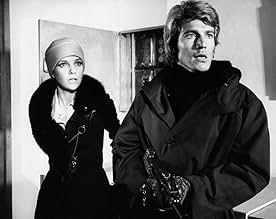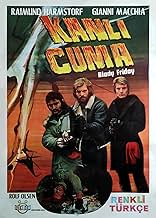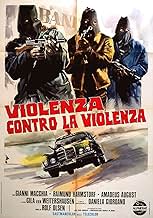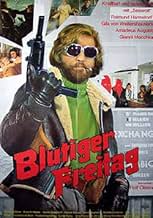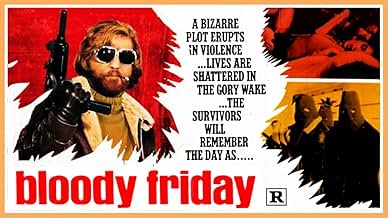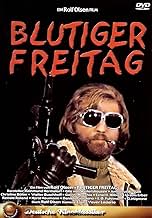Adicionar um enredo no seu idiomaWhen terrorists rob a bank all hell is let loose.When terrorists rob a bank all hell is let loose.When terrorists rob a bank all hell is let loose.
- Direção
- Roteiristas
- Artistas
Totò Mignone
- Franz Muhl
- (as Ottone Mignone)
Claudius Casagrande
- Niki
- (não creditado)
Robert Furch
- Mann im Justizpalast
- (não creditado)
Karin Glier
- Nickys Mutter
- (não creditado)
Imo Heite
- Amerikanischer Soldat
- (não creditado)
- Direção
- Roteiristas
- Elenco e equipe completos
- Produção, bilheteria e muito mais no IMDbPro
Avaliações em destaque
Heinz is a bit of a nutter. While heading to court, he manages to escape with the help of his mates and gives two policemen a severe beating for their troubles. Hunted nationwide, Heinz plans to rob a bank and start a new life in another country, with the help of his Italian mate and his girlfriend Helen, plus Helen's brother Christian, an AWOL soldier who is a last minute replacement for a guy who was captured during Heinz's escape.
Christian is reluctant to help and does so only to protect his sister, but he becomes more worried about the whole situation when Heinz starts displaying not-so-sane tendencies, including nearly murdering to American soldiers they were robbing for explosives. He goes ahead with the plan however, which turns out to be more complicated and dangerous than he thought, and things go wrong almost right away when a small child picks up a hand grenade that Heinz dropped on the way into the bank...
Okay, there's not much plot to be honest, but it's a good film nonetheless, mostly due to gigantic actor Raimund Harmstorf as the psychotic Heinz and his interactions with his hostages, plus his confidence that his plan is going to work, despite the self-evident truths. This is also a film that doesn't skimp on the violence, especially when a cop jumps on a hand grenade to protect the public. It's the goriest part of the film and something that was sure to shock audiences back in the day. Ah, the seventies.
Grim from beginning to end. What else can I say?
Christian is reluctant to help and does so only to protect his sister, but he becomes more worried about the whole situation when Heinz starts displaying not-so-sane tendencies, including nearly murdering to American soldiers they were robbing for explosives. He goes ahead with the plan however, which turns out to be more complicated and dangerous than he thought, and things go wrong almost right away when a small child picks up a hand grenade that Heinz dropped on the way into the bank...
Okay, there's not much plot to be honest, but it's a good film nonetheless, mostly due to gigantic actor Raimund Harmstorf as the psychotic Heinz and his interactions with his hostages, plus his confidence that his plan is going to work, despite the self-evident truths. This is also a film that doesn't skimp on the violence, especially when a cop jumps on a hand grenade to protect the public. It's the goriest part of the film and something that was sure to shock audiences back in the day. Ah, the seventies.
Grim from beginning to end. What else can I say?
Violent criminal mastermind, Heinz Klett (Raimund Harmstorf) escapes police custody in order to pull off his latest caper. Rejoining his cronies and acquiring heavy military weaponry, the gang sets out to rob a bank.
Unfortunately, everything goes pear-shaped. Surrounded by the police, Klett and company grow more desperate by the second. Then, a kid gets a hold of a grenade and... BOOM!
The true strength of BLOODY FRIDAY is the Klett character. Harmstorf is an imposing figure like a Kodiak bear, only hairier! His enormousness is accentuated by his giant Elvis sunglasses, leather pants, and bomber jacket. Harmstorf gobbles up his role with gusto and sadistic glee.
This is a classic of German / Italian crime cinema...
Unfortunately, everything goes pear-shaped. Surrounded by the police, Klett and company grow more desperate by the second. Then, a kid gets a hold of a grenade and... BOOM!
The true strength of BLOODY FRIDAY is the Klett character. Harmstorf is an imposing figure like a Kodiak bear, only hairier! His enormousness is accentuated by his giant Elvis sunglasses, leather pants, and bomber jacket. Harmstorf gobbles up his role with gusto and sadistic glee.
This is a classic of German / Italian crime cinema...
Relentlessly tough and mean-spirited bank robbery drama is straightforwardly made as a sleazy actioner, populated throughout with disagreeable characters, but actually is not any much more than that (despite having gained a certain cult status).
In this hard-boiled German-Italian production, Heinz Klett (Raimund Harmstorf), an anarchistic, mad-dog criminal, orchestrates a tricky escape from a Munich courthouse, right out from under the noses of police guards. With his gang -- Luigi (Gianni Macchia), Army deserter Christian (Amadeus August), and Christian's pregnant sister, Helen (Christine Böhm) -- Heinz next plans to rob the Deutsche Finanzbank so he can escape Germany and retire.
The heist is a bungled affair, as there isn't much money in the vault. But the robbers take ten hostages, including the heiress to a supermarket empire, and capitalize on the situation by demanding a million dollars in ransom and various modes of transportation out of the country. The police must contend with both the robbers and citizens who try to take over the investigation at every turn. In a marked contrast to how an American action film might depict a similar crisis, the cautious German constabulary readily accedes to all of Heinz's demands.
When Heinz and company receive the ransom money, they hijack a few of the hostages, including the heiress and a lesbian businesswoman who isn't impressed by Heinz's macho posturing. They get sidetracked to a country cabin, where the robbers' loyalties deteriorate. When a sympathetic Christian helps the heiress escape, she tips off the cops. Heinz rapes and murders the lesbian, while Luigi dies from an accidental gunshot wound. The cops surround the cabin and gun down Heinz, Christian, and Helen.
BLOODY FRIDAY is remarkable for not glamorizing its criminal protagonists, which was not the norm for crime movies of the late 60s and early 70s. It is only when the robbers are finally ambushed that director Rolf Olsen's staging makes a play for sympathy -- be they misguided youth or misunderstood human trash, did they deserve to die? Well, yes.
Olsen, who was more comfortable dabbling in lightweight sex films and mondo's, crams enough incident into the plot to keep our interest. The robbers' heist and subsequent flight from justice recalls every cliche in the book, but some scenes are remarkable -- the suspenseful escape from the courthouse; a toddler carrying a hand grenade outside the bank as if it were a toy; the massacre of the protagonists (equipped with extra large blood squibs); and a remarkably unpleasant rape scene, which is superimposed over slaughterhouse and, if you watch closely, hardcore sex footage.
Most of the cast underplays, which makes Harmstorf's intense performance as Heinz seem better than it is. However, his "Sea Wolf" is amusingly trashy, that of a cigar-chomping, machine gun wielding psychotic.
For those with a background in the social climate of 1972 Germany, one can discern the film's political subtext, with pointed references to Baader-Meinhof and the climate of social malaise that motivates the desperate thieves, as well as the ease with which they nab guns and start terrorizing the upper-class establishment.
The heist is a bungled affair, as there isn't much money in the vault. But the robbers take ten hostages, including the heiress to a supermarket empire, and capitalize on the situation by demanding a million dollars in ransom and various modes of transportation out of the country. The police must contend with both the robbers and citizens who try to take over the investigation at every turn. In a marked contrast to how an American action film might depict a similar crisis, the cautious German constabulary readily accedes to all of Heinz's demands.
When Heinz and company receive the ransom money, they hijack a few of the hostages, including the heiress and a lesbian businesswoman who isn't impressed by Heinz's macho posturing. They get sidetracked to a country cabin, where the robbers' loyalties deteriorate. When a sympathetic Christian helps the heiress escape, she tips off the cops. Heinz rapes and murders the lesbian, while Luigi dies from an accidental gunshot wound. The cops surround the cabin and gun down Heinz, Christian, and Helen.
BLOODY FRIDAY is remarkable for not glamorizing its criminal protagonists, which was not the norm for crime movies of the late 60s and early 70s. It is only when the robbers are finally ambushed that director Rolf Olsen's staging makes a play for sympathy -- be they misguided youth or misunderstood human trash, did they deserve to die? Well, yes.
Olsen, who was more comfortable dabbling in lightweight sex films and mondo's, crams enough incident into the plot to keep our interest. The robbers' heist and subsequent flight from justice recalls every cliche in the book, but some scenes are remarkable -- the suspenseful escape from the courthouse; a toddler carrying a hand grenade outside the bank as if it were a toy; the massacre of the protagonists (equipped with extra large blood squibs); and a remarkably unpleasant rape scene, which is superimposed over slaughterhouse and, if you watch closely, hardcore sex footage.
Most of the cast underplays, which makes Harmstorf's intense performance as Heinz seem better than it is. However, his "Sea Wolf" is amusingly trashy, that of a cigar-chomping, machine gun wielding psychotic.
For those with a background in the social climate of 1972 Germany, one can discern the film's political subtext, with pointed references to Baader-Meinhof and the climate of social malaise that motivates the desperate thieves, as well as the ease with which they nab guns and start terrorizing the upper-class establishment.
"Whatever they can do in Italy, we can do better" they must have thought in Germany. Extremely violent crime thrillers were very popular in Italy during the early 70's and at least a dozen of awesome ones got released every year. "Bloody Friday" is more or less Germany's response to this successful trend and a damn perplexing one, I may add! When the heavy criminal Heinz Klett escapes police custody during his transport to court, he promptly executes his plans to commit the biggest bank robbery ever in the history of the country. He, his regular partner and his girlfriend's brother storm into the bank heavily armed and take 10 people hostage. While the police attempts to gather the $1.000.000 ransom, and entire media circus unfolds outside on the streets. You usually know pretty much exactly how this kind of movie develops. Things don't go according to plan, there's the Stockholm Syndrome and a couple of unplanned deaths along the way. Apparently the film is inspired by similar real-life events as they occurred in Germany. I don't know which parts of the film were fictionalized, but I seriously wonder if the real events ended in such a nauseating and shocking bloodbath as well. I hope not. Probably the greatest accomplishment here is the biting social satire. While the hostage is going on inside, the public outside shouts for the re-implementation of the death penalty and there are even are some sly businessmen that unscrupulously want to make money out of the gathered crowd. It's certainly also not a film for people with an easily upset stomach or tangled nerves. Heinz' escape is bloody already and there's massively shocking sequence involving a hand grenade at the beginning of the hold-up. "Bloody Friday" is well-directed (by the guy who did "Shocking Asia"), the acting performances are pretty great and everything else (music, editing, photography, atmosphere) is simply in-your-face brutal and confronting.
Você sabia?
- CuriosidadesIn 2015, Subkultur Entertainment started a crowdfunding campaign via Kickstarter to restore the film which was successful. During the restoration it was discovered that the soundtrack was longer than the film itself. This resulted in raiding the vaults at the production company Lisa Film. There, a film reel was discovered which contained scenes cut to obtain a rating from the FSK. In the end, the original director's cut was restored in 4K resolution.
- Versões alternativasGerman theatrical version was cut to secure a "Not under 18" rating. Only in 2017 the uncut version was released on DVD/Blu-ray.
Principais escolhas
Faça login para avaliar e ver a lista de recomendações personalizadas
Detalhes
- Tempo de duração1 hora 34 minutos
- Proporção
- 1.66 : 1
Contribua para esta página
Sugerir uma alteração ou adicionar conteúdo ausente

Principal brecha
By what name was Blutiger Freitag (1972) officially released in India in English?
Responda
